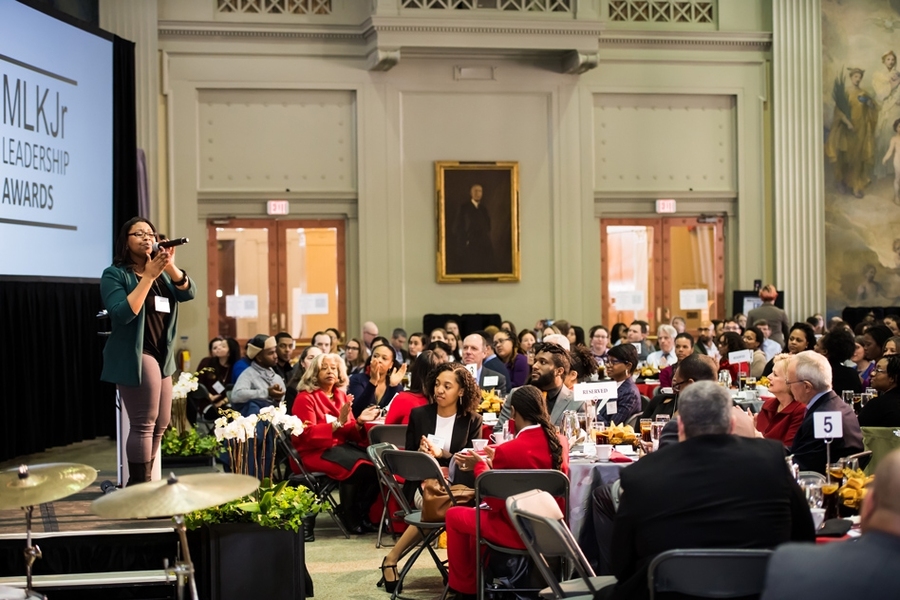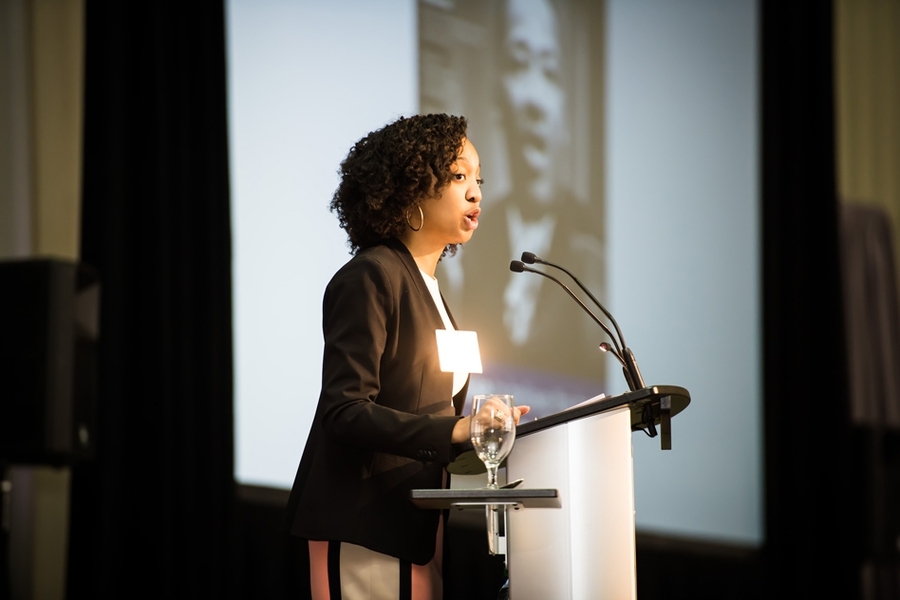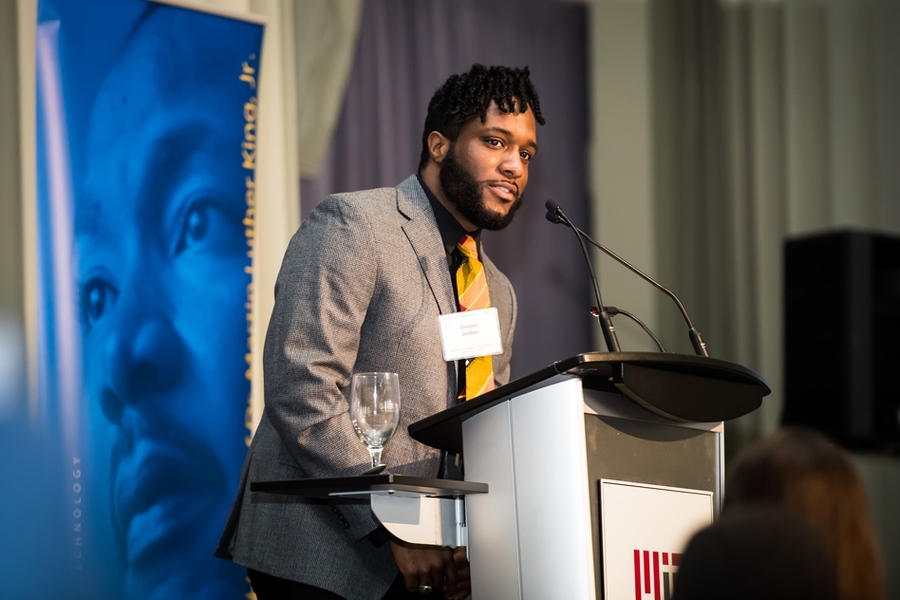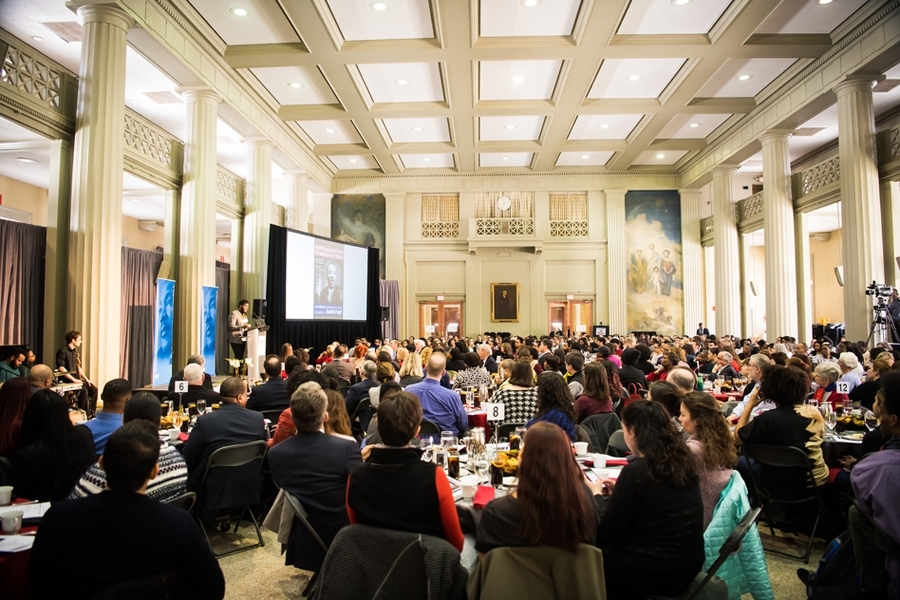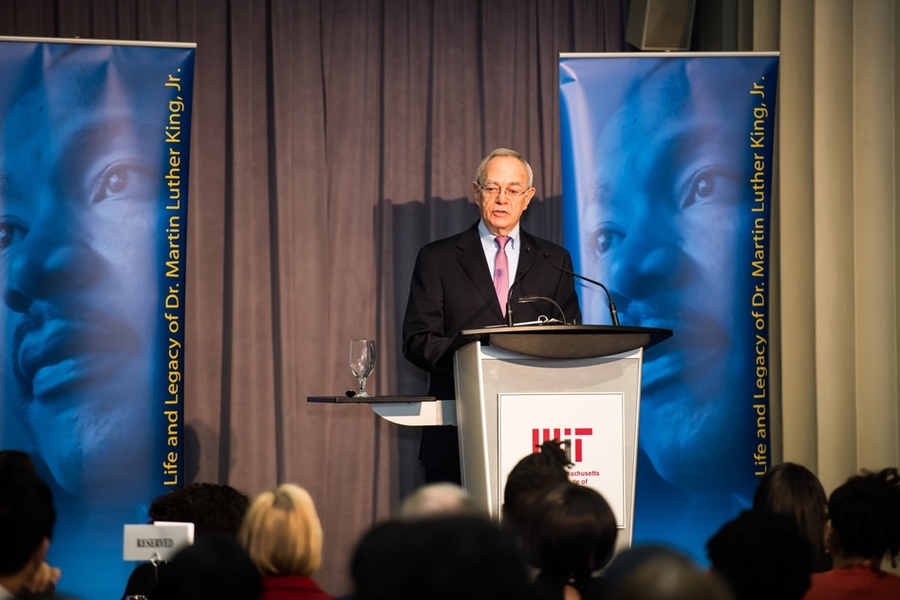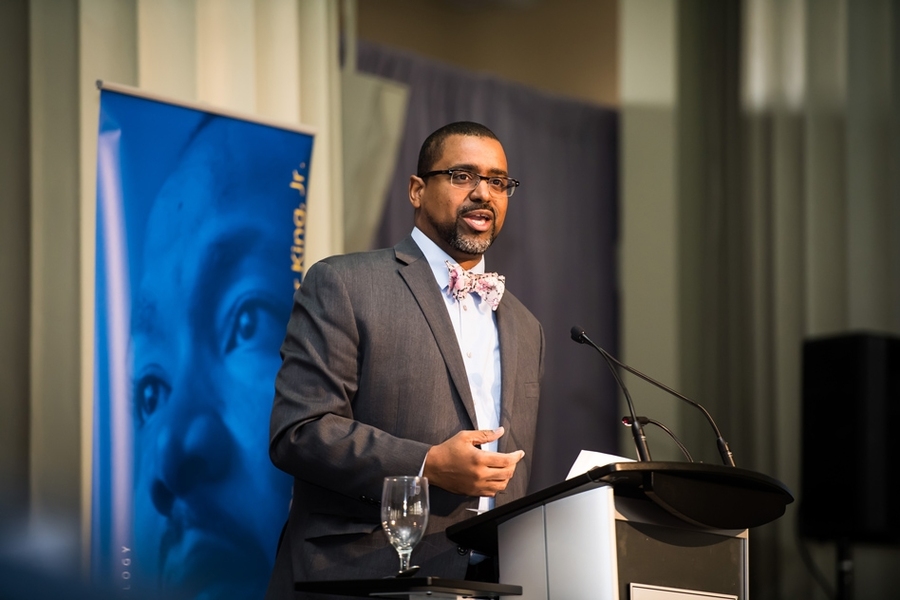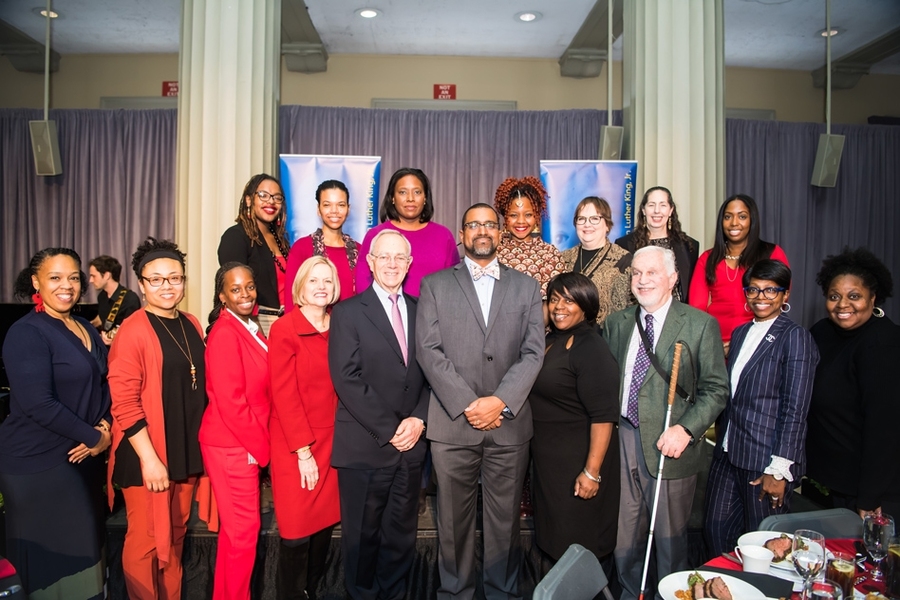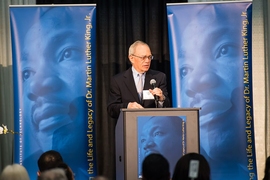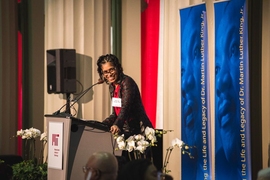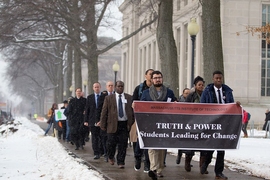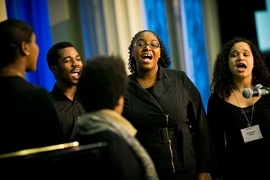In one of the less-remembered passages of Martin Luther King Jr.’s celebrated “I have a dream” speech in 1963, he spoke eloquently about the large debt owed by this country to its black citizens after centuries of oppression — which he described as a bad check that was being returned from the bank of justice, marked “insufficient funds.”
That passage formed the theme for this year’s 45th annual MIT Martin Luther King Jr. celebration luncheon, which featured a keynote address by Rahsaan Hall, director of the Racial Justice Program for the Massachusetts branch of the American Civil Liberties Union. “We refuse to believe the bank of justice is bankrupt,” the event’s program proclaimed.
MIT President L. Rafael Reif, referring to King’s words, said that “he spoke at a moment when the nation was rocked by painful inequality and violent suppression. Yet somehow, even in the face of so much turmoil, he was hopeful.”
Reif continued, “He made it clear that, to remain true to its ideals, America’s ‘bank of justice’ owes everyone the same essential guarantee of freedom and equality. Today, we obviously have not conquered discrimination, inequality, and violence. But I believe we can see some signs that the story is changing. And we can certainly see opportunities for each of us to help accelerate that change.”
As one clear example of that progress, he said, “Let’s take a moment to appreciate the fact that the U.S. Congress is now the most diverse in our nation’s history!” And, he said, despite the disturbing stories about political leaders in Virginia who were found to have worn blackface, “even in this discouraging story, I believe there is an important thread of hope.” In King’s time, he said, such activities would have been considered routine, but that’s no longer true. “Today — fortunately, finally! — it is a public outrage.”
In introducing Hall, Reif cited some of his achievements working with the ACLU: “Through a strategic combination of advocating on Beacon Hill, pursuing targeted lawsuits, and engaging people in their neighborhoods, Rahsaan works to advance racial justice in communities across the state,” he said.
Hall also reflected on King’s famous speech, pointing out that while his uplifting words of hope are well-remembered, and the speech “touches us in a very special way,” sometimes people gloss over the tough critique of American society that he also expressed. King referred to the lives of African-Americans as “a lonely island of poverty in the midst of a vast ocean of material prosperity,” and he went on to say that “it’s obvious today that America has defaulted on its promissory note … instead of honoring its sacred obligations, it has given its Negro citizens a bad check.”
He added that King said “he refused to believe that the bank of justice is bankrupt. He refused to believe that there are insufficient funds in the great vaults of opportunity of this nation. So we have come to cash this check, that will give us on demand the riches of freedom and security of justice.”
Hall pointed out that while King spoke of the lofty vision embodied in the U.S. Constitution, its drafters never really imagined that it would apply to all of humanity, including black people, native Americans, and women. “Even though King’s vision was one of hope and of high ideals, the reality is that this [Constitution] is a document that is rooted in a history of white supremacy. Not white supremacy as people think of skinheads and neo-Nazis and alt-right, but white supremacy as a system or structure of beliefs that center and prioritize and lift up and normalize white lives, white values, white beliefs, at the expense of the lives, values, property, behavior, and cultures of people of color.”
He described in detail some of the laws and policies after emancipation that codified a deep level of discrimination and disempowerment, including laws that criminalized not having a job or a permanent residence, and that he said amounted to a new form of state-sanctioned slavery. Discrimination continued to be formalized well into the 20th century, through “separate but equal” policies that enforced segregated housing and education. “Jim Crow did not operate alone. He had an Uncle, and his name was Sam,” Hall said.
Even though there has been much progress, Hall said, recent research has shown a mixed picture, with both advances and setbacks since the Kerner Commission report in the 1960s that found systematic discrimination throughout American society. “I say to you that the bank of justice is not actually bankrupt,” he concluded, “but rather America’s account is overdrawn. There is too much justice for a small segment of society, at the expense of too many others.”
The annual luncheon, as always, included musical selections as well as tributes to this year’s recipients of the Martin Luther King Jr. Leadership Award and to visiting professors and scholars, as well as talks by selected graduate and undergraduate students.
Dasjon Jordan, a graduate student in the Department of Urban Studies, said that the promissory note King spoke of “was not just about racial harmony and handholding. But Dr. King’s address was explicitly about racial and economic justice. It was about people of color having their rights as Americans activated and being able to access fair employment opportunities, housing, education, and to simply provide quality lives for their families.”
Jordan asked, “What are we doing as a body to not only make sure that classrooms aren’t just diverse and inclusive by the number of skin tones we count, but by the content of our curriculum and our actions to prioritize equity and racial justice? We must remember that diversity and inclusion are not substitutes for justice and equity. Justice and equity should not be a suggestion here, but our collective mission.
“The world is watching not only what we produce, but the values we championand processes we take to get there,” he said. “These values and processes become the checks we deposit to America’s bank as we work. … Our engagement should bring problems of racial, economic, and social injustice to the heart of our institution and our daily actions. We must all ask ourselves the hard questions and hold ourselves accountable to solving them with fierce urgency.”
Nikayah Etienne, a senior in mechanical engineering, described growing up in a predominantly black, immigrant community and school, and finding that she first really experienced being a racial minority when she began her studies at MIT. She realized that while this made her highly visible, it also made her often overlooked. But she soon found groups of black students and faculty in which she felt included and respected.
“I’m leaving here with significant lessons and experiences,” she said. “I leave here knowing that I have grown as an activist. I leave here knowing that I want to continue to touch the lives of young boys and girls who have come from similar backgrounds to me, reminding them that systematic racism and stereotyping do not define their potential.”
She added, “I challenge everyone sitting here, and all the members of the MIT community, to start making it a vision and a priority of yours, to aid students of color in cashing their own checks. I challenge you to take the necessary action to move MIT toward a more equitable community. Let our voices be heard.”
